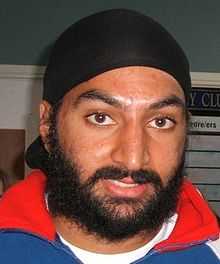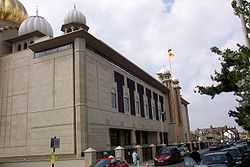Sikhism in England
| This article is part of a series on |
| Sikhism |
|---|
 |
|
Sikh Saints
|
|
Philosophy
|
|
List
|
|
Sikhism portal Indian religions portal |
The permanent arrival of Sikhism in England is dated to 1850 A.D. with the arrival of Maharajah Duleep Singh (last ruler of the Sikh Empire), at Census 2011 there were 7,50,000 Sikhs and in excess of 350 gurudwaras in England with the largest communities in London, Bedford, Coventry, Birmingham, Wolverhampton, Bradford, Leeds, Warwick, Derby, Nottingham, Bristol and Huddersfield.[1][2] Leicester is also important having the largest Sikh community in the East Midlands and the eighth largest Sikh community in England.[3] Leicester is also the home of the Guru Nanak Sikh Museum, the first such museum in the UK.[4] As of 2011, the five English local authorities with the largest percentage of Sikhs are, in descending order, Slough (10.8%), Wolverhampton, Hounslow, Sandwell and Ealing.
Sikh Schools
There are currently 8 Sikh Schools in England that teach the national curriculum alongside Sikh values. These schools are often oversubscribed and outperform regular schools, for example the Nishkam High School in Birmingham was recently rated by Ofsted as outstanding in every area.[5] The Nishkam School Trust is also developing a sister school in West London, which is an area with a large Sikh community, which is due to open in September 2016.[6]
Gurdwaras
Southall, in London, is home to the largest Sikh temple outside India, known as Gurdwara Sri Guru Singh Sabha.[7] It opened in 2003 after almost three years construction and a cost of £17 million.[8] Another large Gurdwara in Gravesend began construction in 2001, and was officially opened in November 2010 .[9] In Sunderland, a former Church of England church has been transformed into a Sikh Gurdwara by the Sunderland Sikh Association.[10]
Many cities, especially those with large Sikh communities, now have several Gurdwaras to cater to their growing congregations. For example, Bradford is a city that now has 6 Gurdwaras. Many Gurdwaras will have had other uses and have been converted from industrial buildings to even former churches that have closed down. Increasingly, Gurdwaras are being purposely built, The Guru Gobind Singh Gurdwara in Bradford is an example of a purpose built Gurdwara.[11]
Sikh Media
Sikhs in England have managed to establish a range of media outlets to propagate and encourage dialogue between Sikhs across the country, predominantly in Punjabi, although increasingly media is produced in English to include the new generation. Many Sikhs still speak Punjabi as a first and second language. In England there are currently no less than 3 Sky channels including, The Sikh Channel, Sikh TV and Sangat TV, all three are also broadcast worldwide and on the internet.[12]
In radio there are numerous stations broadcast on analogue in areas with large Sikh communities as well as internationally on the Sky platform, since 2001 Sukh Sagar on Sky channel 0150 is one such station that was also the world's first 24-hour Gurbani (Sikh prayers) radio station.[13]
Notable English Sikhs

- Maharaja Duleep Singh - The last Maharaja of the Sikh Kingdom, exiled in 1849 during the British Raj and possibly the first permanent Sikh resident in England
- Monty Panesar - England cricketer
- Yan Dhanda - Footballer (England U17's and Liverpool FC youth academy)
- Sir Mota Singh - British Supreme Court Justice
- Kulveer Ranger - London Transport Minister, Mayor's Director of Environment and Digital London
- Gurinder Chadha - Film director
- Parminder Nagra - actress born in Leicester
- Simon Singh - Mathematician and author
- Jasminder Singh - Chairman of the Radisson Edwardian hotel empire[14]
- Tom Singh - Founder of the high street fashion chain New Look[14]
- Jay Sean- R&B Artist
- Akaash Bhatia - British boxer
- Kash Gill - Former kickboxing world champion
- Harpal Singh - Footballer
- Ravi Bopara - England cricketer
- Indy Sagu - Bhangra and hip hop musician
See also
References
- ↑ "2011 Census: KS209EW Religion, local authorities in England and Wales". ons.gov.uk. Retrieved 15 December 2012.
- ↑ [Gurharpal Singh and Darshan Singh Tatla, 'Sikhs in Britain: The Making of a Community' (Zed, 2006)
- ↑ Sikhism in Leicester bbc.co.uk, accessed 15 January 2009
- ↑ Living in Leicester bbc.co.uk, accessed 15 January 2009
- ↑ Nishkam High School Ofsted report, accessed 1 October 2014
- ↑ Nishkam Schools Trust on West London site, accessed 1 October 2014
- ↑ museumoflondon.org.uk, accessed 15 January 2009
- ↑ "£17m Sikh temple opens". BBC News. 30 March 2003. Retrieved 27 April 2011.
- ↑ "Gurdwara open to Gravesend Sikhs after eight years work". BBC News. 19 November 2010. Retrieved 13 May 2013.
- ↑ "Community spirit boosted by Sikh Temple". BBC. 18 May 2006. Retrieved 27 April 2011.
- ↑ Gurdwaras in Bradford, accessed on 1 October 2014
- ↑ Future of Sikh Media, accessed on 1 October 2014
- ↑ Sukh Sagar radio station, accessed on 1 October 2014
- ↑ 14.0 14.1 Sikh London museumoflondon.org.uk, accessed 20 March 2009
External links
- Sikhs in England
- National Network of British Sikh Professionals
- Gurdwara Sri Guru Singh Sabha's official website
| ||||||||||||||||||||||||||||||||||
| ||||||||||||||
